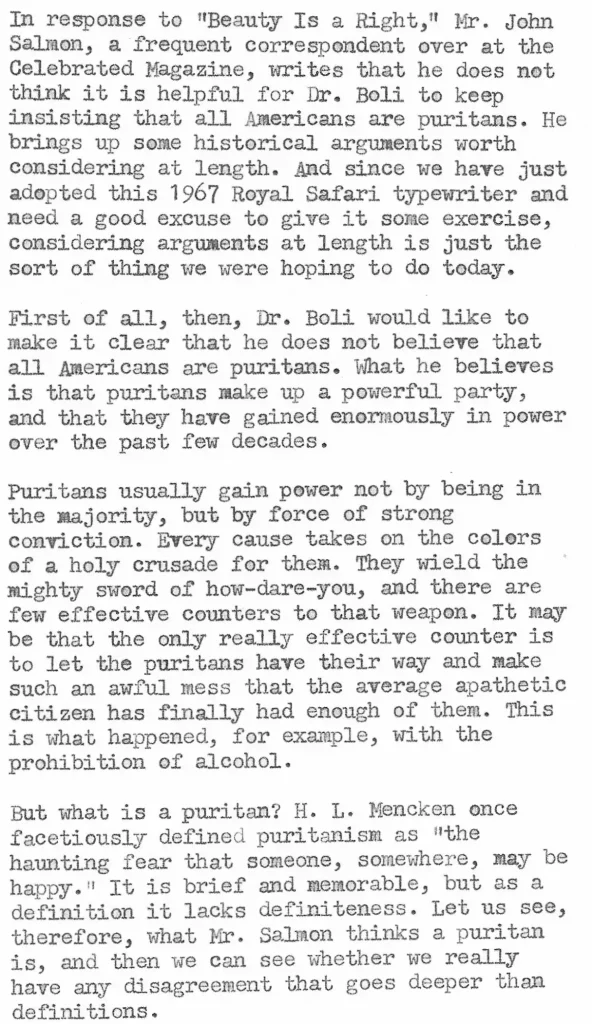
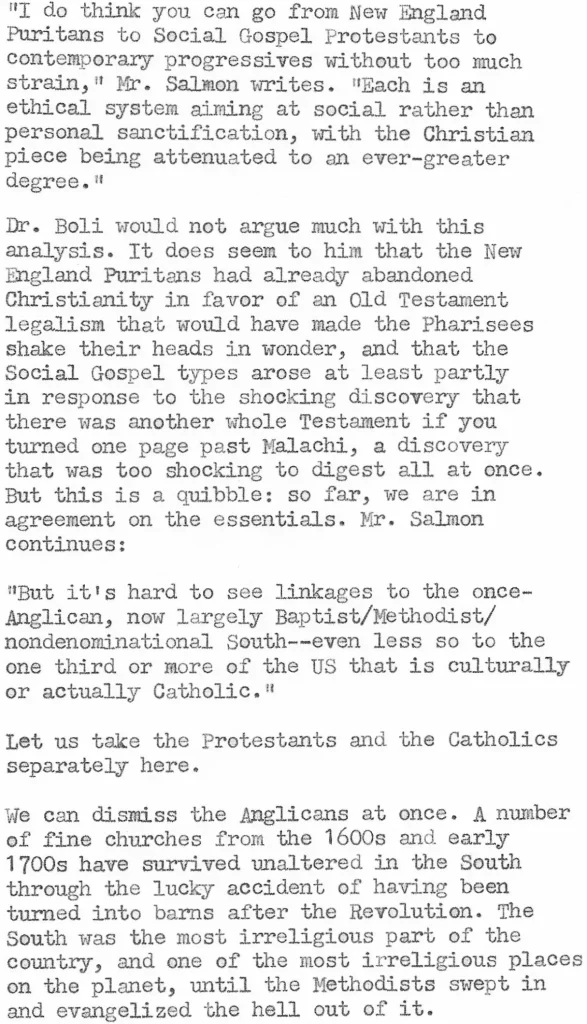
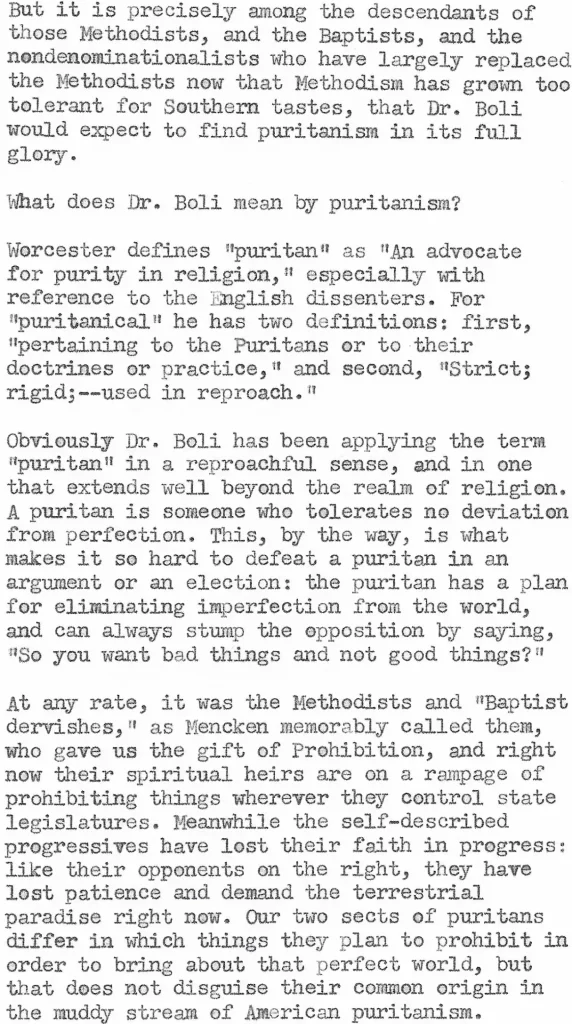
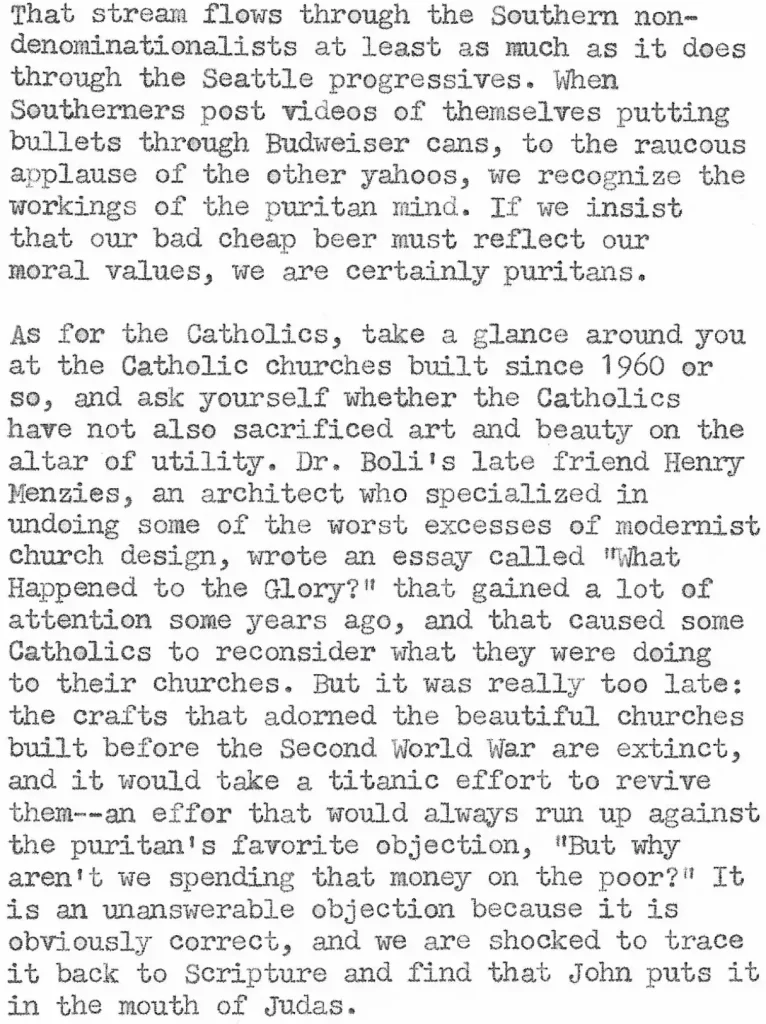
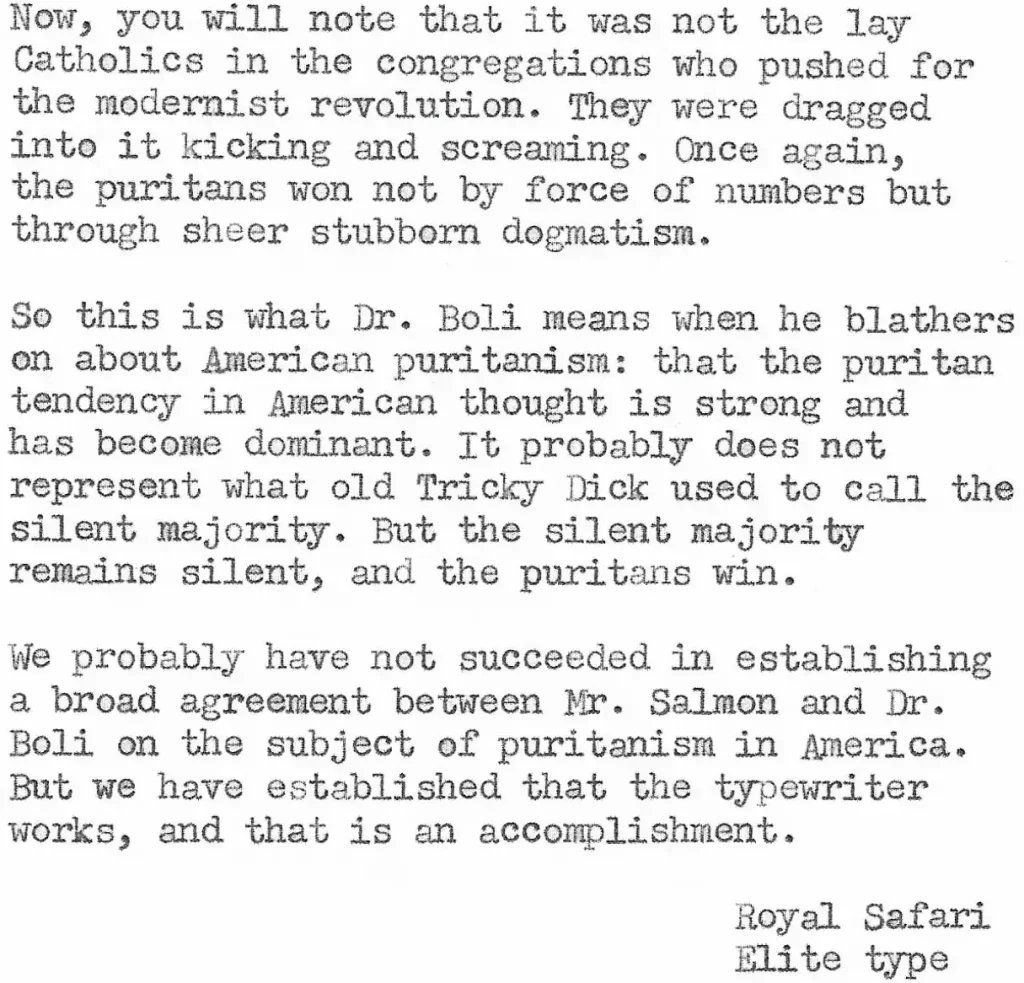
The article to which Mr. Salmon responded was “Beauty Is a Right,” and his two comments are very much worth reading in full.
Here is a copy of Henry Menzies’ essay “What Happened to the Glory?”
Transcribed below.
In response to “Beauty Is a Right,” Mr. John Salmon, a frequent correspondent over at the Celebrated Magazine, writes that he does not think it is helpful for Dr. Boli to keep insisting that all Americans are puritans. He brings up some historical arguments worth considering at length. And since we have just adopted this 1967 Royal Safari typewriter and need a good excuse to give it some exercise, considering arguments at length is just the sort of thing we were hoping to do today.
First of all, then, Dr. Boli would like to make it clear that he does not believe that all Americans are puritans. What he believes is that puritans make up a powerful party, and that they have gained enormously in power over the past few decades.
Puritans usually gain power not by being in the majority, but by force of strong conviction. Every cause takes on the colors of a holy crusade for them. They wield the mighty sword of how-dare-you, and there are few effective counters to that weapon. It may be that the only really effective counter is to let the puritans have their way and make such an awful mess that the average apathetic citizen has finally had enough of them. This is what happened, for example, with the prohibition of alcohol.
But what is a puritan? H. L. Mencken once facetiously defined puritanism as “the haunting fear that someone, somewhere, may be happy.” It is brief and memorable, but as a definition it lacks definiteness. Let us see, therefore, what Mr. Salmon thinks a puritan is, and then we can see whether we really have any disagreement that goes deeper than definitions.
“I do think you can go from New England Puritans to Social Gospel Protestants to contemporary progressives without too much strain,” Mr. Salmon writes. “Each is an ethical system aiming at social rather than personal sanctification, with the Christian piece being attenuated to an ever-greater degree.”
Dr. Boli would not argue much with this analysis. It does seem to him that the New England Puritans had already abandoned Christianity in favor of an Old Testament legalism that would have made the Pharisees shake their heads in wonder, and that the Social Gospel types arose at least partly in response to the shocking discovery that there was another whole Testament if you turned one page past Malachi, a discovery that was too shocking to digest all at once. But this is a quibble: so far, we are in agreement on the essentials. Mr. Salmon continues:
“But it’s hard to see linkages to the once-Anglican, now largely Baptist/Methodist/nondenominational South–even less so to the one third or more of the US that is culturally or actually Catholic.”
Let us take the Protestants and the Catholics separately here.
We can dismiss the Anglicans at once. A number of fine churches from the 1600s and early 1700s have survived unaltered in the South through the lucky accident of having been turned into barns after the Revolution. The South was the most irreligious part of the country, and one of the most irreligious places on the planet, until the Methodists swept in and evangelized the hell out of it.
But it is precisely among the descendants of those Methodists, and the Baptists, and the nondenominationalists who have largely replaced the Methodists now that Methodism has grown too tolerant for Southern tastes, that Dr. Boli would expect to find puritanism in its full glory.
What does Dr. Boli mean by puritanism?
Worcester defines “puritan” as “An advocate for purity in religion,” especially with reference to the English dissenters. For “puritanical” he has two definitions: first, “pertaining to the Puritans or to their doctrines or practice,” and second, “Strict; rigid; –used in reproach.”
Obviously Dr. Boli has been applying the term “puritan” in a reproachful sense, and in one that extends well beyond the realm of religion. A puritan is someone who tolerates no deviation from perfection. This, by the way, is what makes it so hard to defeat a puritan in an argument or an election: the puritan has a plan for eliminating imperfection from the world, and can always stump the opposition by saying, “So you want bad things and not good things?”
At any rate, it was the Methodists and “Baptist dervishes, as Mencken memorably called them, who gave us the gift of Prohibition, and right now their spiritual heirs are on a rampage of prohibiting things wherever they control state legislatures. Meanwhile the self-described progressives have lost their faith in progress: like their opponents on the right, they have lost patience and demand the terrestrial paradise right now. Our two sects of puritans differ in which things they plan to prohibit in order to bring about that perfect world, but that does not disguise their common origin in the muddy stream of American puritanism.
That stream flows through the Southern non- denominationalists at least as much as it does through the Seattle progressives. When Southerners post videos of themselves putting bullets through Budweiser cans, to the raucous applause of the other yahoos, we recognize the workings of the puritan mind. If we insist that our bad cheap beer must reflect our moral values, we are certainly puritans.
As for the Catholics, take a glance around you at the Catholic churches built since 1960 or so, and ask yourself whether the Catholics have not also sacrificed art and beauty on the altar of utility. Dr. Boli’s late friend Henry Menzies, an architect who specialized in undoing some of the worst excesses of modernist church design, wrote an essay called “What Happened to the Glory?” that gained a lot of attention some years ago, and that caused some Catholics to reconsider what they were doing to their churches. But it was really too late: the crafts that adorned the beautiful churches built before the Second World War are extinct, and it would take a titanic effort to revive them–an effort that would always run up against the puritan’s favorite objection, “But why aren’t we spending that money on the poor?” It is an unanswerable objection because it is obviously correct, and we are shocked to trace it back to Scripture and find that John puts it in the mouth of Judas.
Now, you will note that it was not the lay Catholics in the congregations who pushed for the modernist revolution. They were dragged into it kicking and screaming. Once again, the puritans won not by force of numbers but through sheer stubborn dogmatism.
So this is what Dr. Boli means when he blathers on about American puritanism: that the puritan tendency in American thought is strong and has become dominant. It probably does not represent what old Tricky Dick used to call the silent majority. But the silent majority remains silent, and the puritans win.
We probably have not succeeded in establishing a broad agreement between Mr. Salmon and Dr. Boli on the subject of puritanism in America. But we have established that the typewriter works, and that is an accomplishment.
Royal Safari
Elite type

Leave a Reply